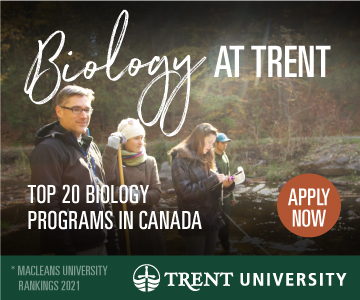Conservation Biology
The world needs skilled practitioners who can inform planning and economic activities through the lens of sustainability and conservation. Examine the human impact on biodiversity, helping to develop practical, evidence-based approaches to conserving nature and wildlife. Through this specialization you will build knowledge in ecology, evolution, and population genetics, while taking advantage of opportunities for field placements at regional, provincial, and national agencies.
Note
- BIOL 4400Y: Internship in Conservation Biology. Students must apply in the academic year before enrolment in the course. Applications can be obtained online at trentu.ca/biology/experience. Enrolment is limited and competitive.
Courses
Students who have fulfilled the requirements for a single- or joint-major Honours degree in Biology may graduate with a Specialization in Conservation Biology if they have successfully completed the following 5.5 credits:
1.5 BIOL credits consisting of:
- BIOL 3380H: Advanced Ecology
- BIOL 3391H: Conservation Biology
- BIOL 3600H: Ecological Genetics
1.0 BIOL credit from:
- BIOL 4400Y: Placement in Conservation Biology (must apply by April in year prior to enrolment)
- BIOL 4890Y: Community-Based Research Project
3.0 credits from the following:
- BIOL-ERSC-SAFS 2350H: Ecological Agriculture
- BIOL 3050H: Limnology
- BIOL 3090H: Biology of Insects
- BIOL 3140H: Fish Ecology
- BIOL 3170H: Plant Evolution and Diversity
- BIOL 3190H: Wild Plants of Ontario
- BIOL 3340H: Herpetology
- BIOL-PSYC 3360H: Behavioural Ecology
- BIOL 3850H: Field Course
- BIOL 3851H: Field Course
- BIOL 3852H: Field Course
- BIOL 4030H: Research Design and Data Analytics
- BIOL 4110H: Infectious Disease Biology
- BIOL 4140H: Ornithology
- BIOL 4150H
- BIOL 4180H: Mammalogy
- BIOL-ERSC 4240H: Fisheries Assessment and Management
- BIOL-ERSC 4330H: Global Change of Aquatic Ecosystems
- BIOL 4410H: Urban Ecology
- BIOL 4500H: Population Dynamics
- BIOL-FRSC 4510H: Species-at-Risk Biology and Policy
- BIOL 4520H: Biology of Invasions
- BIOL 4610H: Evolutionary Ecology
- ERSC-GEOG 3010H: Fundamentals of Geographical Information Systems Analysis
- ERST 3110H: Environmental Impact Assessment
- ERSC 3160H: Community-Based Natural Resource Management
- ERSC 3200Y: Management of Forest Ecosystems
- ERSC-BIOL 3260H: Applied Biomonitoring
- ERST-PHIL 3301H: Environmental Ethics
- ERST-PHIL-SAFS 3302H: Animals and Society
- ERSC 3510H: Ecology and Management of Wetland Systems
- ERSC-GEOG-SAFS 3650H: Soil Management and Conservation
- ERSC 4520H: Restoration Ecology
- ERSC-GEOG 4640H: Integrated Watershed Management Approaches and Methods
- ERST-CAST-HIST 4670H: Environmental History
- ERSC/ERST 4801H: Greening the Campus: Green Infrastructure
- ERSC/ERST 4802H: Greening the Campus: Institutions and Built Environment
- ERST 4810H:
- GEOG-ERSC 3020H: Remote Sensing of the Environment
Program Coordinator
P. Wilson, BSc, MSc, PhD (McMaster)
Resume Boosters:
- Gain hands-on experience working with agencies across the environmental sector
- Learn from professors who are experts in their field and practicing conservation biologists
- Benefit from access to state-of-the-art labs and facilities in Trent’s DNA, Life & Health Sciences Building

Career Paths:
Featured
Biologist
Biologists and related scientists conduct basic and applied research to extend knowledge of living organisms, to manage natural resources, and to develop new practices and products related to medicine and agriculture. They are employed in both laboratory and field settings by governments, environmental consulting companies, resource and utilities companies, chemical, pharmaceutical and biotechnical companies and health and educational institutions.
Career Opportunities
- Species-at-Risk Biologist
- Environmental Lawyer
- Research Scientist
- Ecologist
- Zoo Biologist
- Ecological Consultant
- Conservation Manager
- Veterinarian
Admission Requirements
More Requirements
Discover Ontario's
#1 Undergrad University
Where award-winning architecture meets state-of-the-art research facilities and dynamic student spaces.
Visit TrentReady to Take the Next Step?
Tell us more about yourself and we’ll tell you all the reasons you belong at Trent.
Stay in Touch

